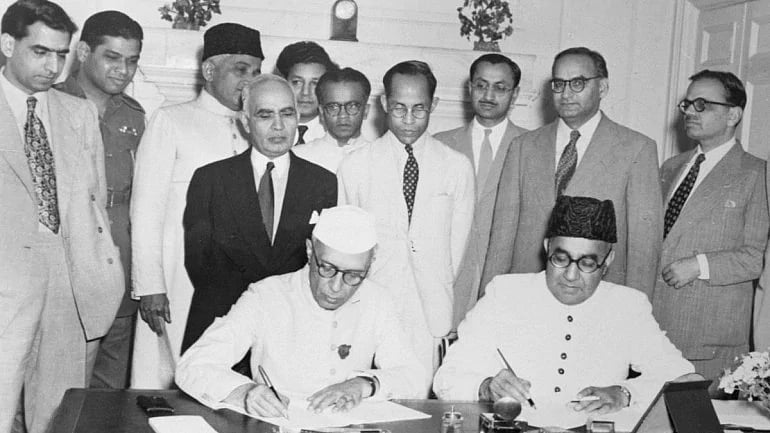The Liaquat–Nehru Pact (or the Delhi Pact) was a bilateral treaty between India and Pakistan in which refugees were allowed to return to dispose of their property, abducted women and looted property were to be returned, forced conversions were unrecognized, and minority rights were confirmed.
The treaty was signed in New Delhi by the Prime Minister of India Jawahar Lal Nehru and the Prime Minister of Pakistan Liaquat Ali Khan on April 8, 1950. The treaty was the outcome of six days of talks sought to guarantee the rights of minorities in both countries after the Partition of India and to avert another war between them.
The need for such a pact was felt by minorities in both countries following Partition, which was accompanied by massive communal rioting. In 1950, as per some estimates, over a million Hindus and Muslims migrated from and to East Pakistan (present day Bangladesh), amid communal tension and riots such as the 1950 East Pakistan riots and the Noakhali riots.
“The Governments of India and Pakistan solemnly agree that each shall ensure, to the minorities throughout its territory, complete equality of citizenship, irrespective of religion, a full sense of security in respect of life, culture, property and personal honour, freedom of movement within each country and freedom of occupation, speech and worship, subject to law and morality,” the text of the Pact begins.
“Members of the minorities shall have equal opportunity with members of the majority community to participate in the public life of their country, to hold political or other office, and to serve in their country’s civil and armed forces. Both Governments declare these rights to be fundamental and undertake to enforce them effectively,” it said.
It noted that “The Prime Minister of India has drawn attention to the fact that these rights are guaranteed to all minorities in India by its Constitution”, and that “The Prime Minister of Pakistan has pointed out that similar provision exists in the Objectives Resolution adopted by the Constituent Assembly of Pakistan”.
Also, “Both Governments wish to emphasise that the allegiance and loyalty of the minorities is to the State of which they are citizens, and that it is to the Government of their own State that they should look for the redress of their grievances.”









